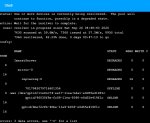I have a very basic setup on an i3 with 6GB ram. Ive been running freeNAS with 2 1 TB disks (mirror). I needed more space so I went into pools status made one of the disks offline. Shutdown freenas and replaced the 1TB HDD with a 2 TB HDD. Switched FreeNAS back on and clicked replace. FreeNAS prompted me to wipe the disk so I did that. After replacing, it said it would take around 4 or 5 hours to resilver. I checked again the next day and it was resilvering again. and im running in a degraded state as of now.
I plan on replacing the other 1 TB HDD as well. As you must have noticed im new to this and am learning as I go.
Thanks!
I plan on replacing the other 1 TB HDD as well. As you must have noticed im new to this and am learning as I go.
Thanks!

